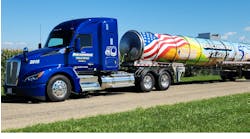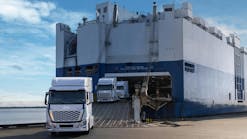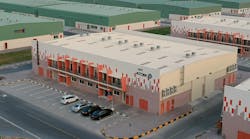Atom Alloys recently launched a “revolutionary” fuel explosion prevention system dubbed ATOM.
The company, which is based in the U.S. but maintains its corporate office in Dubai, UAE, says its new technology suppresses the explosion of hydrocarbon fuels in storage and transportation units. ATOM was developed over 10 years of research and trials by a global team of professionals based in the U.S., the UAE, and India. The innovation addresses one of the world’s most pressing challenges: the colossal damage to human lives, property and the environment due to fuel storage explosions around the world.
“Fossil fuel consumption is peaking and yet most consumers appear unaware or are complacent about the risks associated with liquid fuel and vapors,” said John Fillmon, executive vice president of Atom Alloys. “Be it the industries, communities or the environment, we all stand to lose every time a fuel tank explodes.
“There is also significant disparity in the frequency of such explosions between the developed and developing world, the latter even more at risk with a less-evolved fuel storage and transport infrastructure. These explosions are preventable, and as an impact-driven company we believe it is our duty to help create a progressive blueprint for global fuel safety.”
Addressing a global challenge
From LPG cylinder blasts to massive blasts of fuel tankers at industry sites, “fire and explosion” is one of the top 10 global business risks in 2021, the company said. The National Fire Protection Association’s latest Fire & Life Safety Ecosystem report illustrates the escalation of explosions across the world, including more than 37,000 fires that occur at U.S. industrial and manufacturing properties annually.
More than 100 fuel explosions from across the world have been reported since 2019, most of them avoidable. Recent ones include the explosions of 10,000 propane tanks at the Marshfield, Mo., plant, the 2019 Philadelphia Energy Solutions Refinery explosion, the 2021 explosion at a Beirut home that came from stockpiled fuel cans, and the massive explosion of hundreds of fuel tankers in Herat, Iran-Afghanistan border. The list goes on. These explosions affected human lives and caused extensive material and environmental damage.
Tested, certified solution
While fire protection and mitigation systems have been developed in recent years, ATOM is the first tested, proven and certified solution to offer a full-range system of explosion prevention to liquid and vapor fuel storage at industrial scale, without the need for any human intervention or triggering factors to function, according to Atom.
By reducing explosion risks of liquid fuels and vapors, it shifts the safety standards from mitigation to active hazard prevention. ATOM’s impact objective is to reduce explosion disaster risks and enable a risk mitigation strategy that provides “unprecedented” levels of safety with fuel storage in all industries and communities.
Safety ecosystem
Applicable at any scale, ATOM creates an ecosystem of safety. The technology can protect every workplace that uses fuel and convert them into safe zones.
ATOM was developed by drawing on innovation in materials sciences, design engineering and fire dynamics. The Atom Alloys team designed a passive protection module, applicable across all fuel storage and transportation units, which cuts the deflagration process from escalating to detonation.
Following successful trials for military application, ATOM won four patents from the U.S. Patent & Trademark Office and is registered in Patent Cooperation Treaty (PCT) countries. It has also been tested and certified by the Underwriters Laboratory in Chicago, Ill.; Southwest Research Institute in Texas; Bureau Veritas in France; and Emirates Industrial Laboratory in the UAE. ATOM is compliant to international standards like NFPA 69, ASTM, ICAO and IMDG, the company said.
Product-level applications
ATOM can be applied at a ready-made product level, such as a 20-liter jerrycan or 2,000 liter-skids for dynamic and static storage, or even massive 60,000-liter containerized fuel units. Sector-specialized explosion safety solutions such as fuel tankers for the oil and gas industry, mobile fuelers for the fuel delivery business, marine fuel tanks for the maritime industry and storage tanks for industrial and civil uses are value additions.
Atom says it is the first manufacturer to receive the “explosion resistant” verification from the U.S.-based Underwriters Laboratory for its fuel storage units. Atom has developed prototypes for defense establishments and supplied products to large multinationals and oil majors like Nakagawa Bussan and Indian Oil Corporation.
Experts from Atom Alloys engage with customers through a seven-step journey, which starts with an on-site evaluation of flammable fuels at client premises. This is followed by a first-hand technical exchange with the client on the history and issues faced. Next, ATOM designs and installs a customized system that protects from all the enlisted explosion risks with patented technology products. The team also conducts periodic checks and recycles used products to promote sustainability.
Impact objectives
According to experts, years of decarbonization efforts can be reversed by the carbon emissions from just one fuel tank explosion. The Disaster Risk Reduction (DRR) potential offered by ATOM helps to protect lives, prevent business interruption, and mitigate environmental damage and harmful emissions from explosions.
Atom’s system helps organizations and governments fulfil their Environment, Social and Governance (ESG) commitments, especially as the world is rallying ahead to take strong actions regarding climate change. ATOM actively contributes to the United Nations Sustainable Development Goals No 3 (good health and well-being), 9 (industry, innovation and infrastructure), 13 (climate action) and 17 (Partnerships for the goals) and works towards the triple pillars of People, Planet and Prosperity.
Manufacturing in the UAE
Atom has set up manufacturing and distribution facilities in the UAE, which also will serve as a regional hub to expand the company’s operations across the Middle East, one of the global energy centers, where ATOM can deliver value by helping to prevent fuel-storage explosions.
Successful demos have been held in the energy sector majors and civil defense units in the Middle East, with imminent deals to be signed, marking the first regional application of ATOM, according to the company. More details on the agreements will be announced in the future.
Atom Alloys’ manufacturing and inventory hub in Hamriyah, Sharjan, and its production facilities in India, have secured ISO 9001, 14001, and 18001 certifications.
Visit atomalloys.com for more information.











